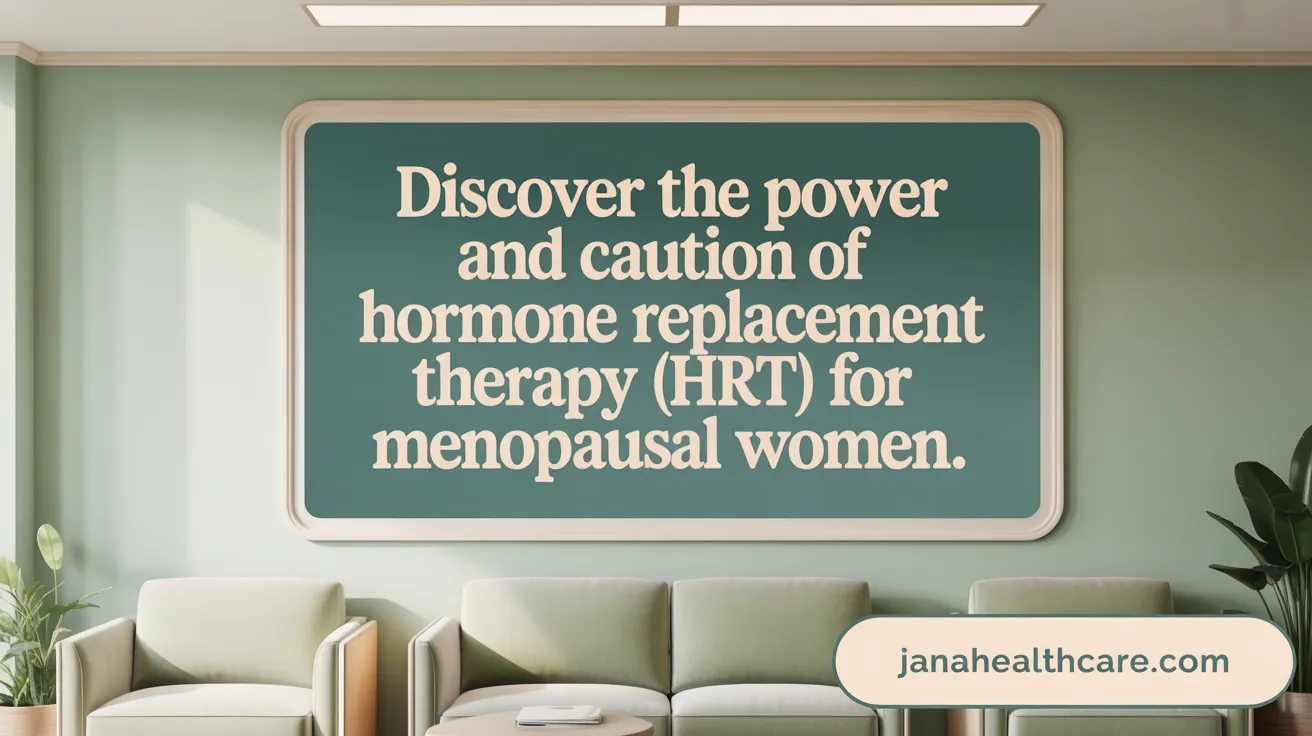Understanding the Critical Role of Hormones in Women's Energy and Mood
The Importance of Hormone Balance for Women's Health
Hormone balance plays a vital role in women's overall health, influencing mood, energy levels, sleep quality, and reproductive function. Maintaining proper hormone levels is essential for feeling vibrant and resilient through various life stages such as puberty, pregnancy, and menopause. When hormones are balanced, women tend to experience stable moods, consistent energy, and better sleep patterns.
Key Hormones and Their Impact on Mood and Energy
Several hormones control how women feel and function daily. Estrogen, often regarded as a mood stabilizer, supports neurotransmitters like serotonin and dopamine, which regulate happiness and emotional well-being. Progesterone complements estrogen in sustaining mental calmness and physical health. Testosterone influences vitality and libido, while thyroid hormones directly regulate energy metabolism, affecting how energized or fatigued women feel. Lastly, cortisol, the body’s primary stress hormone, impacts the body's stress response and can affect mood when elevated.
Signs and Symptoms of Hormonal Imbalance
An imbalance in these hormones may manifest through various physical and emotional symptoms. Common signs include mood swings, unexplained weight changes, fatigue, sleep disturbances, hot flashes, skin changes such as acne or hair loss, and irregular menstrual cycles. Women may also experience anxiety, irritability, or difficulty concentrating, which underscores the connection between hormones and mental health. Recognizing these symptoms early and consulting healthcare professionals can help manage imbalances effectively, enhancing quality of life.
What Hormones Influence Energy and Mood?
Key Hormones Affecting Women's Health
Women's health is profoundly influenced by a network of hormones, each playing distinct roles in regulating mood, energy, and overall well-being. The major hormones include estrogen, progesterone, thyroid hormones, and cortisol.
What Types of Hormones Affect Mood, Energy, and Overall Health in Women?
Estrogen supports the brain's serotonin and dopamine systems, which are essential for mood stability and emotional balance. Progesterone also contributes to mood regulation and works alongside estrogen to maintain hormonal harmony.
Thyroid hormones are critical for controlling metabolism and energy production. An underactive or overactive thyroid can lead to fatigue, mood disturbances, and altered energy levels. Meanwhile, cortisol, often called the stress hormone, affects how the body responds to stress and regulates energy. Chronic high cortisol can impair mental resilience, disrupt sleep, and elevate fatigue.
How Hormonal Changes Impact Mental Health and Energy
Fluctuations in these hormones, such as those occurring during hormonal changes during puberty, menstrual cycles, pregnancy, or perimenopause and menopause symptoms, can result in noticeable changes in mood and energy. For example, declining estrogen levels may contribute to increased anxiety and depressive symptoms, while thyroid imbalances can cause lethargy or irritability. Managing these hormonal shifts through lifestyle changes for hormone balance, nutritional support, and when appropriate, medical interventions, is essential for maintaining mental well-being and sustaining energy throughout the different stages of a woman’s life.
Understanding the interplay of these hormones allows for better personalized care and supports holistic strategies to enhance women's emotional and physical health. For more about hormones and mental health and how to manage symptoms naturally, consider resources on natural ways to balance hormones.
Recognizing Hormonal Imbalance: What to Look For

What are common symptoms of hormonal imbalance?
Hormonal imbalance in women can present through a variety of symptoms that affect physical, emotional, and reproductive health. Common signs include mood swings, fatigue, hot flashes, irregular or painful periods, trouble sleeping, weight gain, skin changes such as acne, hair loss, and fertility difficulties.
What physical, emotional, and reproductive signs might indicate hormonal imbalance?
Women experiencing hormonal shifts often notice physical changes like unexplained weight fluctuations and persistent fatigue. Emotionally, mood swings and irritability are frequent, alongside anxiety or depression due to hormone effects on brain neurotransmitters. Reproductive signs include changes in menstrual cycles, such as irregular or heavy bleeding, and difficulties with fertility, as described in Signs of Hormonal Imbalance in Women.
How are fatigue, mood swings, and weight changes linked to hormone imbalances?
Hormones like estrogen, progesterone, cortisol, and thyroid hormones regulate energy, stress response, and metabolism. An imbalance can disrupt these functions, resulting in tiredness, emotional volatility, and altered weight. For example, elevated cortisol from chronic stress may cause fatigue and weight gain, while thyroid disorders can slow metabolism and impact mood. Learn more about how hormones influence health and their effects of hormones on mood and weight.
Recognizing these symptoms early facilitates timely evaluation and management. Women experiencing multiple signs should consult healthcare providers for appropriate hormone testing and treatment and personalized treatment that supports well-being and quality of life.
How Are Hormonal Imbalances Diagnosed and Treated?

How is hormonal imbalance diagnosed and treated?
Hormonal imbalances require thorough medical evaluation to ensure accurate diagnosis and effective treatment. Typically, diagnosis begins with a detailed review of Symptoms of Hormonal Imbalance combined with a medical history consultation and a physical examination. This comprehensive assessment helps identify patterns related to Hormonal Imbalance Causes and hormonal health.
Blood tests are the primary tool used to measure levels of key hormones such as estrogen, progesterone, testosterone, thyroid hormones, and cortisol. Additional tests might include urine or saliva analysis and imaging studies to investigate Endocrine Gland Issues. These tests help pinpoint specific hormonal deficiencies or excesses that could be causing symptoms.
Treatment options are tailored to the individual's unique hormone profile and health status. Hormone Replacement Therapy (HRT) is common for women experiencing menopausal hormone declines, helping to alleviate symptoms like hot flashes, mood swings, bone density loss, and sleep disturbances. HRT can be customized with various delivery methods including pills, patches, gels, and vaginal creams.
Beyond medication, lifestyle changes play a vital role in managing hormone balance. Adopting a nutritious diet rich in proteins, healthy fats, and fiber supports hormone production and insulin sensitivity. Regular physical activity enhances hormone receptor sensitivity and energy regulation. Additionally, stress reduction techniques and ensuring 7 or more hours of quality sleep nightly help regulate stress hormones such as cortisol.
For residents of Brooklyn and nearby areas, consulting healthcare providers specialized in endocrinology or women's health can provide personalized plans combining medical treatment and holistic wellness approaches. Early diagnosis and well-rounded care are essential to improving quality of life and reducing the impact of hormone imbalances on mental, physical, and reproductive health.
Hormone Replacement Therapy: Benefits and Risks Explained

What is Hormone Replacement Therapy (HRT) and How Does It Work?
Hormone Replacement Therapy for Menopause (HRT) is a medical treatment designed to replenish estrogen and progesterone hormones that decline during menopause. This therapy comes in various forms, including pills, patches, gels, vaginal creams, and intrauterine devices, offering personalized options tailored to individual needs. For women without a uterus, estrogen-only therapy is commonly used, while those with an intact uterus often receive a combination of estrogen and progesterone to protect uterine health.
Symptom Relief and Long-Term Health Benefits of HRT
HRT is widely recognized for effectively alleviating menopausal symptoms such as hot flashes, night sweats, vaginal dryness, mood swings, insomnia, and urinary issues. Beyond immediate symptom relief, HRT also plays a protective role in preventing osteoporosis by maintaining bone density—a vital consideration for postmenopausal women. Additionally, starting HRT within 10 years of menopause or before age 60 has been shown to lower risks of heart disease and type 2 diabetes, while potentially enhancing muscle strength. For more information, see Benefits of HRT.
Potential Risks and Recommendations for Safe Use
While HRT offers substantial benefits, it is important to understand the associated risks. These include a slight increase in the likelihood of breast and uterine cancers, blood clots, stroke, and gallbladder disease, with risk levels varying by hormone type, duration of use, and individual health factors. The risk of breast cancer is higher with combined estrogen-progesterone therapy, especially after 3-5 years of use, whereas estrogen-only therapy carries a lower risk. Women using non-oral forms like patches or gels have a reduced chance of blood clots.
To maximize benefits and minimize risks, healthcare providers recommend starting HRT early in menopause, using the lowest effective dose, and regularly monitoring health. Treatment duration is often limited to less than five years, with ongoing assessments to adjust care. Learn more about HRT and menopausal symptom relief.
What Should Patients Know About Hormone Replacement Therapy (HRT)?
HRT replaces estrogen and progesterone lost in menopause, relieving symptoms like hot flashes and mood swings while preventing osteoporosis. It carries low risks when started within 10 years of menopause and under age 60 but requires personalized monitoring due to possible cancer and cardiovascular risks. Consulting with healthcare providers experienced in menopausal care, especially in places like Brooklyn, NY, helps tailor therapy to individual health profiles and wellness goals. Further guidance is available at Hormone therapy for menopause.
Natural Strategies to Support Hormonal Balance
What natural lifestyle strategies support hormonal balance?
Hormonal balance is essential for women’s health, influencing mood, energy, and overall wellness. Several natural ways to balance hormones can help maintain this balance effectively.
Diet and Nutrition
Eating a balanced diet rich in protein intake for hormone production, healthy fats, and fiber supports hormone production and regulation. Consuming 25-30 grams of protein per meal from sources like eggs, chicken, lentils, and fish is vital for synthesizing peptide hormones that regulate metabolism and stress.
Healthy fats, including omega-3 fatty acids from fatty fish and monounsaturated fats from avocados, nuts, and olive oil, improve insulin sensitivity and stabilize blood sugar. A high-fiber diet benefits for hormones with foods such as beans, nuts, and avocados promotes fullness hormones and aids hormone regulation.
Exercise and Weight Management
Regular physical activity, including cardio and strength training, enhances physical activity and hormone receptor sensitivity hormonal health by increasing hormone receptor sensitivity and improving insulin function. Exercise also helps maintain a moderate weight, reducing risks of insulin resistance and fertility issues.
Stress Reduction and Sleep Hygiene
Managing stress through relaxation techniques like yoga, journaling, or nature walks lowers cortisol levels, which when elevated, can disrupt hormone balance and increase fat storage.
Getting at least seven hours of quality sleep per night is crucial. Poor sleep alters hormones like insulin, ghrelin, leptin, and growth hormone, leading to increased appetite, weight gain, and hormonal disruption as explained in sleep and hormone regulation.
Role of Healthy Fats, Fiber, and Gut Health
Gut health plays an integral role in hormonal balance by modulating insulin resistance and fullness cues. Supporting a diverse microbiome through gut health and hormonal balance high-fiber and fermented foods enhances hormone regulation.
Incorporating these natural habits provides a holistic foundation for optimal hormonal health, supporting energy, mood, and overall well-being. For more insights, see Hormone Balance for Women.
How Hormonal Shifts Affect Women's Mental Health
How do hormones influence women's mental health?
Hormones play a vital role in regulating Hormones and Women's Mental Health by impacting brain neurotransmitters that modulate mood and emotional resilience. Estrogen, in particular, supports the production and function of serotonin and dopamine, two key neurotransmitters responsible for mood stabilization and feelings of well-being.
What effects do hormonal changes have across women's life stages?
Throughout the different stages of life—Hormonal Changes During Puberty, pregnancy, postpartum, Perimenopause and Menopause Symptoms—women experience significant hormonal fluctuations. These changes can lead to mood swings, anxiety, depression, and emotional instability. For example, the drop in estrogen levels during menopause is often linked to increased risk for depression and mood disorders.
What supportive approaches help manage these mental health changes?
Maintaining mental well-being during hormonal transitions involves a blend of healthy lifestyle practices and medical interventions when necessary. Nutrient-rich diets including magnesium, omega-3 fatty acids, and B vitamins support brain health and mood regulation. Regular physical activity and quality sleep also enhance emotional stability.
Mindful eating, hydration, and limiting stimulants such as caffeine contribute to overall mental wellness. When symptoms persist or worsen, professional options like Hormone Replacement Therapy (HRT), psychotherapy, or support groups can provide significant relief. Tracking Menstrual Cycles for Mood Patterns empower women to anticipate and proactively manage symptoms.
Women in Brooklyn and similar communities can access specialized care through local providers who offer integrated support for hormonal and mental health challenges.
The Role of Integrated Care at Jana HealthCare for Hormonal Health
What types of services does Jana HealthCare offer?
Jana HealthCare provides a multifaceted service model that combines primary healthcare, chronic disease management, and preventive medicine with cosmetic dermatology and wellness therapies. Their offerings include Botox and laser treatments, nutritional counseling, and stress management, all designed to support both health and aesthetic goals. This integration supports Hormone Balance for Women by addressing physical health, skin conditions, and emotional well-being.
What does integrated clinical care involve at a multidisciplinary practice like Jana HealthCare?
Integrated clinical care means that a team of specialists—ranging from medical providers to dermatologists and wellness experts—work collaboratively. This ensures personalized treatment plans that consider the whole individual, not just isolated symptoms. By continuously communicating and coordinating care, Jana HealthCare enhances outcomes related to Managing Hormonal Symptoms and overall health.
What are the benefits of receiving cosmetic dermatology treatments at a multidisciplinary clinic?
Patients benefit from comprehensive care where dermatology is closely aligned with wellness and medical perspectives. This collaboration improves treatment safety and effectiveness, particularly for hormone-related skin issues like acne or dryness. Addressing the interplay between Hormone Impact on Mood and Reproductive Health and skin aesthetics leads to better, more sustainable results.
How do wellness therapies complement medical and aesthetic treatments at clinics like Jana HealthCare?
Wellness services such as stress reduction, improved circulation techniques, and nutritional support bolster the body’s capacity to heal and regulate hormones. When combined with medical and cosmetic treatments, these therapies accelerate recovery, reduce side effects, and promote holistic well-being, integral to Lifestyle Changes for Hormone Balance and balancing energy and mood effectively.
When to Talk to Your Doctor: Essential Questions for Hormone Health

Importance of Professional Evaluation
Hormone imbalances can cause symptoms ranging from mood swings, fatigue, irregular periods, to more serious health issues like insulin resistance and osteoporosis. Because these symptoms can mimic other conditions, professional evaluation is crucial. A healthcare provider can accurately diagnose Hormonal Imbalance Causes through medical history review, physical exams, and targeted blood tests. Accurate diagnosis ensures appropriate treatment tailored to individual needs, optimizing health outcomes.
Questions About Symptoms, Tests, and Treatment Options
When consulting with your doctor, it's helpful to ask specific questions to understand your hormonal health better. Consider asking:
- What could be causing my symptoms, and which hormones should be tested?
- What diagnostic tests do you recommend and why?
- What treatment options are available, including Hormone Replacement Therapy for Menopause and natural approaches?
- What are the benefits and risks of these treatments?
- How will treatment be personalized to suit my age, health history, and lifestyle?
- What Lifestyle Changes for Hormone Balance can support hormonal balance alongside medical treatment?
Avoiding Self-Diagnosis and Understanding Individualized Care
Hormonal symptoms overlap with many health issues, making self-diagnosis unreliable and potentially harmful. Social media trends sometimes promote unverified hormone balancing methods. Always seek professional advice for testing and treatment. Hormonal health requires a personalized approach since hormone levels and body responses vary widely among women, especially across different life stages like Hormonal Changes During Puberty, perimenopause, and menopause. Regular follow-ups with a trusted healthcare provider ensure monitoring and adjustments for safe and effective care.
By engaging openly with your healthcare provider and asking these essential questions, you can create a hormone health plan that supports your energy, mood, and overall wellness.
Empowering Women Through Knowledge and Integrated Hormone Care
Hormones profoundly influence women's energy, mood, and overall wellness. Key hormones such as estrogen, progesterone, thyroid hormones, and cortisol regulate mood stability, stress response, sleep quality, and metabolic function. Imbalances can manifest as fatigue, mood swings, sleep disturbances, and changes in weight or skin health.
Recognizing symptoms early and seeking professional guidance are essential. Accurate diagnosis through hormone level testing and comprehensive evaluations helps tailor effective treatments. Self-diagnosis or unverified remedies risk overlooking serious causes and delaying care.
A multidisciplinary approach blends medical expertise with holistic wellness strategies. Collaboration among endocrinologists, gynecologists, nutritionists, and mental health professionals optimizes hormone balance, addresses lifestyle factors like diet, stress, and exercise, and personalizes therapies such as hormone replacement or natural interventions.
This integrated care empowers women to manage hormonal health proactively, enhancing energy, mood, and quality of life with safe, personalized support in a compassionate, comprehensive environment.
